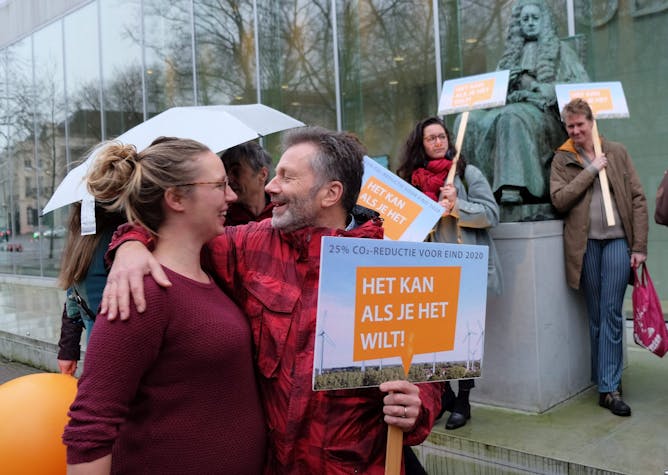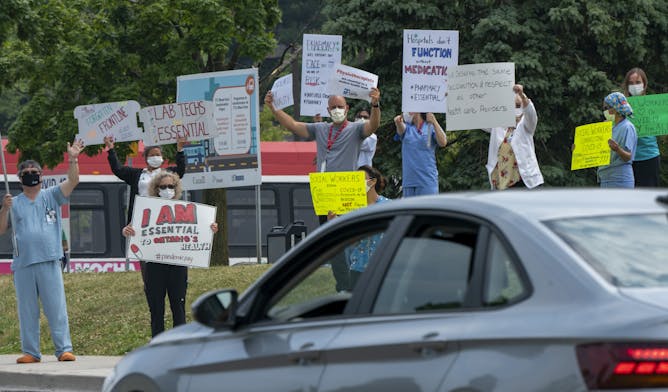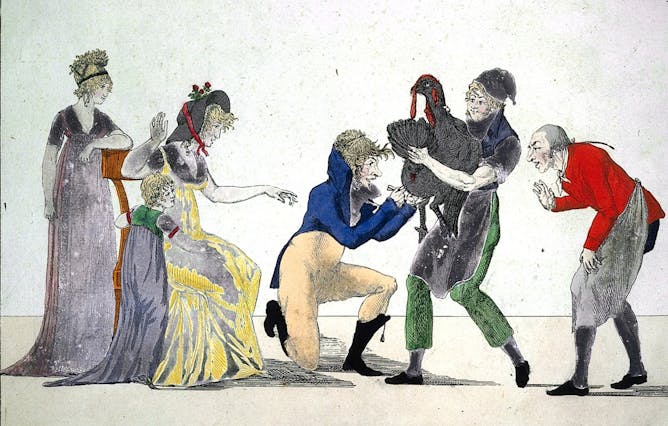|
Late last week, 15 young Canadians took the federal government to court over its failure to protect against climate change. They allege that Canada has violated their Charter rights to life, liberty, security and equality.
Climate cases based on other grounds have failed in Canada in the past. But this one could be different.
Today in The Conversation Canada, Karinne Lantz from Dalhousie University explains why. She points to a landmark case that was upheld by the Netherlands’ Supreme Court: It ruled that the lives of people around the world were being threatened, and that the Dutch government had to slash greenhouse gas emissions by 25 per cent by 2020. Parts of the two cases overlap — and many of the Canadian government’s arguments match those that were unsuccessful for the Dutch government.
Also today:
And in case you missed it:
|

Climate activists gather outside the Supreme Court of the Netherlands on Dec. 20, 2019, ahead of a ruling in a landmark case in which the government was ordered to slash greenhouse gas emissions by 25 per cent by 2020.
(AP Photo/Mike Corder)
Karinne Lantz, Dalhousie University
A ground-breaking court case in the Netherlands could influence the way Canadian courts rule on the government's actions on climate change.
|

Hospital support workers wave to cars honking their horns in support as the protest inequality for essential workers at Rouge Valley Hospital in Toronto in June 2020.
THE CANADIAN PRESS/Frank Gunn
Hilary Young, University of New Brunswick
Provinces shouldn't prevent Canadians from seeking compensation if an essential service provider’s unreasonable acts cause COVID-19 infection.
|

An 1801 etching of a dandified physician taking a lancet to a ‘dindonnade,’ a word signifying both ‘turkey’ and ‘hoax.’ It ridicules the smallpox vaccine, which takes fluid from an animal to insert into a human.
(Wellcome Collection)
Paula Larsson, University of Oxford
The history of anti-vaccination theories can help us understand how such claims capture a popular following. The same misinformation used against 19th century smallpox vaccine is still in use today.
|

En général, développer un nouveau vaccin et le commercialiser peut prendre jusqu'à 10 ans.
Mongkolchon Akesin/Shutterstock
Beatrice Melinek, UCL; Stephen Morris, UCL
Les crises représentent une occasion unique d’innover dans le domaine biomédical et de développer des technologies qui auront des retombées positives pour de nombreuses années à venir.
|
Arts
|
-
Leigh Carriage, Southern Cross University
Joplin's voice stirs something deep within us. What is it about her that still makes us listen?
|
|
Health
|
-
William Petri, University of Virginia; Jeffrey M. Sturek, University of Virginia
The president and first lady Melania Trump have both tested positive for the coronavirus. Here's what the physicians and scientists know about the best treatments for the disease it causes.
|
|
Politics
|
-
Daniel Cooper, Griffith University; Brendon O'Connor, University of Sydney
There are conflicting reports about just how ill the president is with COVID-19, but it is difficult to see it as anything other than a blow to his re-election campaign.
|
|